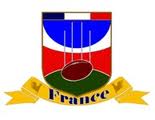04/10/2011
Une équipe locale de football australien a participé à une Coupe du Monde
 Alban Schieber est un jeune illacais qui est parti en Student Exchange avec le Rotary en 2005/2006 dans la petite ville de Mount Gambier (South Australia) où il a découvert le football australien.
Alban Schieber est un jeune illacais qui est parti en Student Exchange avec le Rotary en 2005/2006 dans la petite ville de Mount Gambier (South Australia) où il a découvert le football australien.
"Après l'avoir pratiqué pendant une année entière, le retour au rugby avait un goût amer, avoue le jeune homme. Le football australien est un sport tout jeune en France et à Bordeaux mais qui a tendance à grandir assez vite. Le club des Bordeaux Bombers a été créé en 2008 à Saint Médard pour participer à la 1e édition du championnat de France ainsi qu'à la 1e Coupe de France. Aujourd'hui, il existe des clubs à Bordeaux, Toulouse, Paris, Marseille, Montpellier, Perpignan ou encore Strasbourg. Chaque année, un championnat et plusieurs coupes sont disputés à travers le pays. En moins de 3 ans nous avons réussi à nous structurer et à créer une équipe solide pour devenir cette année championne de France. Suite à une année 2010/2011 exceptionnelle, la moitié des joueurs de l'équipe de Bordeaux a été sélectionnée pour participer à la 4e édition de la coupe du monde de Football australien. Après avoir eu l'honneur d'être capitaine de l'équipe de Bordeaux pendant 2 saisons, j'ai également eu la chance d'être sélectionné en équipe de France pour les coupes d'Europe en Croatie et en Italie mais aussi pour la coupe du Monde 2011 disputée en août à Sydney et Melbourne (Australie). En effet, cette année, la France a participé pour la 1e fois à une coupe du Monde de Football Australien à 18 joueurs. Après un début difficile contre les tenants du titre (défaite contre la Papouasie Nouvelle-Guinée) l'équipe de France a été redirigée en 2e division dans laquelle elle a battu les îles Timor, l'Inde et la Peace Team (Israël et Palestine) pour jouer la petite finale contre les Fidji, qu'elle a perdu. Cependant l'équipe de France a surpris les australiens grâce à ses qualités humaines et à son esprit de fair-play. Et malgré la défaite, je vis aujourd'hui avec des souvenirs plein la tête et la fierté d'avoir pu représenter la France dans une compétition internationale."
Sport roi au pays des kangourous, le football australien se joue à 9 ou à 18 sur un terrain ovale possédant 4 poteaux à chaque extrémité. On peut y retrouver des phases de jeu du Rugby, du basket, du foot ou même du football américain. Alban est entré au "Bordeaux Bombers" en 2009 et il est actuellement l'un des 3 coachs du club (tous ont eu leur diplôme en Australie).

Photos de Melina Isaksson : Récupération de balle et cérémonie d'ouverture.


